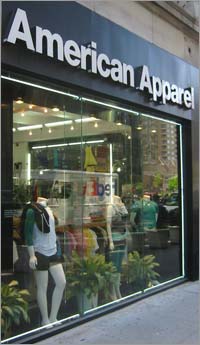In the age of Wal-Mart (WMT), here's how retail works: Your product gets made in Asia, where workers are paid pennies per hour, and then sold at rock-bottom prices in the United States. Any retailer who doesn't work this way is doomed, right?
Wrong. Dov Charney's American Apparel has perfected a different model. The company manufactures all its hoodies, T-shirts, and underwear in a Los Angeles factory that pays its workers an average of $12 an hour. Then it ships the clothes to wholesalers and 150 company-owned stores worldwide. Charney calls it the "vertically integrated clothing company" and claims his gross margins are among the highest in the industry.
Charney gives up access to cheap labor but gains greater control over the quality of his products and speedier delivery from his factory to his stores. "We're going direct to consumers on one end, and direct to labor on the other," Charney says. "There are no middlemen."
Charney has his own labor problems, having been sued several times for sexual harassment. But in the fickle world of fashion, the speed with which he can deliver the latest cut is his competitive advantage. He can produce 100 variations of the same shirt, test them in a few stores, and then roll out the ones that sell best nationwide. A new design can get to the shelves in four days, something that would be impossible if Charney relied on outsourced factories.
| |

